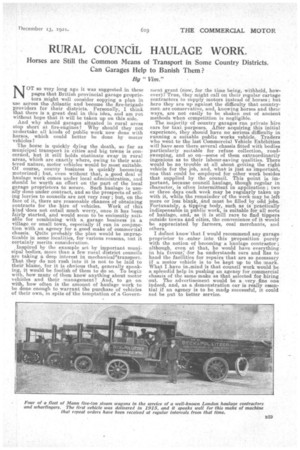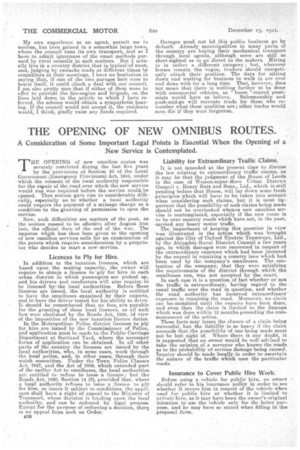RURAL COUNCIL HAULAGE WORK,
Page 27

Page 28

If you've noticed an error in this article please click here to report it so we can fix it.
Horses are Still the Common Means of Transport in Some Country Districts. Can Garages Help to Banish Them ?
By " Vim."
NOT so very long ago it was suggested in these pages that British provincial garage proprietors might well consider copying a plan in use across the Atlantic and become the fire-brigade providers for their districts. Personally, I think that there is a great deal in this idea, and am rot without hope that it will be taken up on this side.
And why should garages situated in rural areas stop short at lire-engines? Why should they not undertake all kinds of public work now done with horses, which could better be done by motor vehicles?
The horse is quickly dying the death, so far as municipal transport in cities and big towns is concert:L.0d, but it still holds obstinate sway in rural areas, which are exactly where, owing to their scattered nature, motor vehicles would be most suitable. Of course, county business is quickly becoming motorized; but, even without that, agood deal of haulage work comes under local administration, and should be worth an effort on the part of the local garage proprietors to secure. Such haulage is usually done under contract, and so the prospects of selling lorries to councils are not very rosy; but, on the face of it, there are reasonable chances of obtaining contracts for the hire of vehicles. Work of this kind 'does not entail much worry, once it has been fairly started, and would seem to be eminently suitable for combining with a garage business in a village or small town especially if run in conjunction with an agency for a good make of commeraial chassis. Quite probably the plan would be impraoticable in some localities, for various reasons, but it certainly merits consideration.
Inspired by the example set by important municipal bodies, more than a few rural district councils are taking a deep interest in mechanicaPtransport. That they do not rush into it is not to be laid to their blame, for it is obvious that, generally speaking, it would be foolish of them to do so. To begin with, how many of them know anything about motor vehicles and their rnanagement? And, to go on with, how often is the amount of haulage work to be done enough to warrant the purchase of vehicles of their own, in spite of the temptation of a Govern
ment grant (now, for the time being, withheld, however)2 True, they might call on their regular cartage contractors to supply. motors instead of horses; but here they are up against the difficulty that countrymen are conservative, and, knowing horses and their ways are not easily to be shaken out of ancient methods when competition is negligible.
The majority of country garages run private hire cars for taxi purposes. After acquiring this initial experience, they should have no serious difficulty in running a suitable public works vehicle. Traders who went to the last Commercial Vehicle Exhibition will have seen there several chassis fitted with bodies particularly suitable for refuse collection, roadsweeping, and so on—some of them extraordinarily ingenious as to their labour-saving qualities. There would be no trouble at all about getting the right important, one for the job, and, what is just as one that could be employed for other work besides that supplied by the council. This point is important, because council haulage, though regular in character, is often intermittent in application; two or three days each week may be regularly taken up with it, while the remainder of the week may be left more or less blank, and must be filled by odd jobs. Fortunately, a tipping body, such as is practically indispensable in public work is suitable for all sorts of haulage, and, as it is still rare to find tippers outside towns and cities, the convenience of it would be appreciated by farmers, coal merchants, and others.
I dornot know'that I would recommend any garage proprietor to -enter into this proposition purely with the notion of becoming a haulage contractor ; although, even at that, he would have everything. in his favour; .for he understands cars and Has to hand the facilities for repairs• that are so necessary if a motor vehicle is to be kept up to the mark. What I have in.mind is that council work would be a splendid help in pushing an agency for commercial chassis of the same make as that selected for hiring • out. The advertisement would be a very fine one indeed, and, as a demonstration car is really essential if an agency is to be made successful, it could not be put to better service. My own experience as an agent, permit me to confess, has been gained in a somewhat large town, where the council runs its own transport, and so I have to admit ignorance of the exact methods pursued by rural councils in such matters. But I actually live in a country district that is typical of most, and, judging by remarks made at different times by councillors at their meetings, I have no hesitation in saying that, if one of the two garages here were to bestir itself, it could clinch a deal with our council. I an also pretty sure that if either of them were to offer to provide the fire-engine and brigade, on the lines laid down in the article to which. I have referred, the scheme would obtain a sympathetic hearing. If the council would not accept it, the residents would, I think, gladly raise any funds required. Garages must not Id this public business go by default. Already municipalities in many parts of the country are buying their mechanical transport through local agents, although some are still so short-sighted as to go direct to the makers. Hiring is in rather a different category ; 'but, wherever horses remain the vogue, traders should energetically attack their position. The days for sitting down and waiting for business to walk in are over and done with for a long time. That, however, does not mean that there is nothing further to be done with commercial vehicles. as " boom "-reared pessi mists would have us believe. Salesmanship and push-and-go will tecreate trade for those who remember what those qualities are; other trades would soon die if they were forgotten.
































